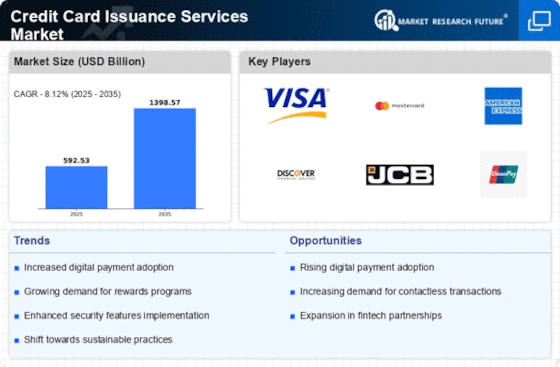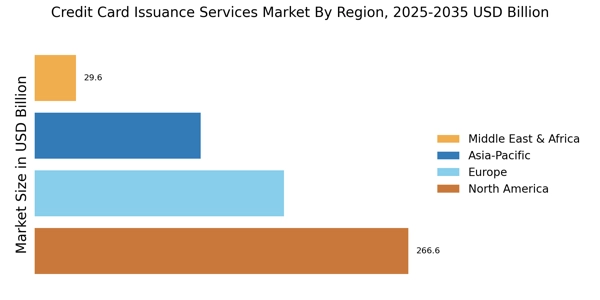Regulatory Changes
The Credit Card Issuance Services Market is subject to evolving regulatory frameworks that can significantly impact operations. Recent regulatory changes aimed at consumer protection have led to increased transparency in credit card terms and conditions. For instance, new guidelines require issuers to provide clearer disclosures regarding fees and interest rates, which may influence consumer choices. Additionally, regulations promoting fair lending practices are reshaping how creditworthiness is assessed, potentially expanding access to credit for underserved populations. These regulatory shifts may compel issuers to adapt their strategies, ensuring compliance while maintaining competitiveness. As the landscape continues to evolve, the Credit Card Issuance Services Market must remain agile to navigate these changes effectively.
Consumer Demand for Credit
The Credit Card Issuance Services Market is significantly influenced by the rising consumer demand for credit. As disposable incomes increase and consumer confidence grows, individuals are more inclined to utilize credit cards for purchases. Recent data indicates that credit card usage has surged, with a 15% increase in outstanding credit card debt observed in the past year. This trend suggests that consumers are increasingly relying on credit for both everyday expenses and larger purchases. Additionally, the growing trend of e-commerce has further fueled this demand, as consumers prefer the convenience and rewards associated with credit card transactions. Consequently, credit card issuers are expanding their offerings to cater to this burgeoning market, enhancing their product portfolios to attract a wider customer base.
Technological Advancements
The Credit Card Issuance Services Market is experiencing a notable transformation due to rapid technological advancements. Innovations such as artificial intelligence and machine learning are streamlining the application and approval processes, enhancing customer experience. In 2025, it is estimated that over 70% of credit card applications will be processed digitally, reflecting a shift towards automation. Furthermore, the integration of advanced analytics allows issuers to better assess credit risk, leading to more informed lending decisions. This technological evolution not only improves operational efficiency but also fosters a competitive landscape where issuers can differentiate their offerings. As a result, the Credit Card Issuance Services Market is likely to witness increased participation from fintech companies, which are leveraging technology to disrupt traditional banking models.
Increased Focus on Customer Experience
The Credit Card Issuance Services Market is witnessing a heightened emphasis on customer experience as a key differentiator. Issuers are increasingly recognizing that providing exceptional service can lead to customer loyalty and retention. In 2025, it is projected that over 60% of consumers will prioritize customer service quality when selecting a credit card provider. This trend has prompted issuers to invest in user-friendly digital platforms, personalized communication, and responsive customer support. Moreover, the integration of loyalty programs and rewards tailored to individual preferences is becoming commonplace, enhancing the overall customer journey. As competition intensifies, the ability to deliver a superior customer experience will likely be a critical factor in determining success within the Credit Card Issuance Services Market.
Emergence of Alternative Payment Solutions
The Credit Card Issuance Services Market is facing challenges from the emergence of alternative payment solutions, which are reshaping consumer payment preferences. Digital wallets, buy now pay later services, and cryptocurrencies are gaining traction among consumers, particularly younger demographics. Recent surveys indicate that nearly 40% of millennials prefer using digital wallets over traditional credit cards for transactions. This shift in consumer behavior may compel credit card issuers to innovate and adapt their offerings to remain relevant. As alternative payment methods continue to proliferate, the Credit Card Issuance Services Market must explore partnerships and integrations that enhance their value propositions, ensuring they meet the evolving needs of consumers.

















